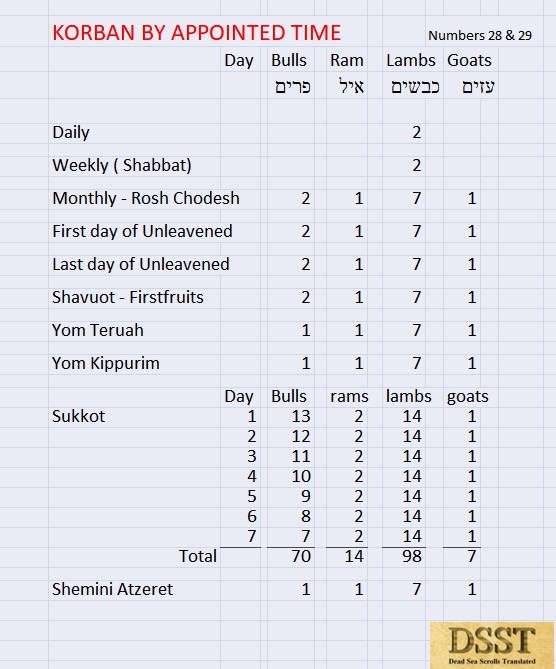
 Numbers 29 vs 18 – 21
Numbers 29 vs 18 – 21
These are the sacrifices for each day of Sukkot, particularly for the 2nd and 3rd days. We see a large break/space between verses 19 and 20.
The word Korban means “to approach” and “to draw near”. These are the processes in which we are sanctified/made holy/set apart so that we may draw near and approach Him. The English translations, most often, refer to these as sacrifices and offerings.
In Numbers 28 and 29, we find a complete list of instructions for the amounts of animals to be sacrificed for each specific appointed time. Almost all of these animals are Olah/Assent offerings. The Assent offering is completely consumed on the altar of fire and ascend up in smoke as a sweet aroma to Him. They are completely burnt up. Each individual does not offer this amount of animals, but these numbers represent the amounts for the whole nation of millions.
The sacrifice of the goats (specifically, hairy goats/שעיר עזים, refers to young goats of the first year) is for chatat/ חטאת. While most English translations call the chatat a”sin offering” this offering is for sanctification. This offering sets us apart as a special and holy people different from all other peoples.
Often overlooked within these instructions is the word Ti-meed/תמיד/continually. These offerings are to be done year by year continually.
Also pictured, is a chart showing the Olah/Assent offerings and the Chatat/חטאת offering. Not included in the chart is the accompanied Minchah/מנחה/grain offering and the Nesek/ נסך/drink offerings required for each. Each offering require a specific amount of grain/flour and a drink portions of wine.
The whole process of Korban is fascinating and filled with meaning! It describes the process in which we may draw close and approach Him. It is possible that more text is directed to this process than to any other single topic. The first seven chapters of Leviticus alone are devoted to this process of Korban. “Why”, one may ask, because this process is important!




